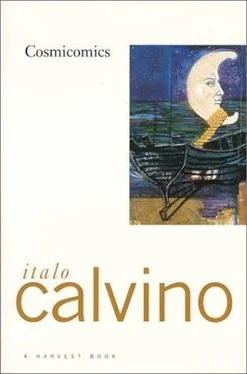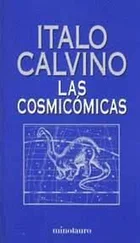I thought only of the Earth. It was the Earth that caused each of us to be that someone he was rather than someone else; up there, wrested from the Earth, it was as if I were no longer that I, nor she that She, for me. I was eager to return to the Earth, and I trembled at the fear of having lost it. The fulfillment of my dream of love had lasted only that instant when we had been united, spinning between Earth and Moon; torn from its earthly soil, my love now knew only the heart-rending nostalgia for what it lacked: a where, a surrounding, a before, an after.
This is what I was feeling. But she? As I asked myself, I was torn by my fears. Because if she also thought only of the Earth, this could be a good sign, a sign that she had finally come to understand me, but it could also mean that everything had been useless, that her longings were directed still and only toward my deaf cousin. Instead, she felt nothing. She never raised her eyes to the old planet, she went off, pale, among those wastelands, mumbling dirges and stroking her harp, as if completely identified with her temporary (as I thought) lunar state. Did this mean I had won out over my rival? No; I had lost: a hopeless defeat. Because she had finally realized that my cousin loved only the Moon, and the only thing she wanted now was to become the Moon, to be assimilated into the object of that extrahuman love.
When the Moon had completed its circling of the planet, there we were again over the Zinc Cliffs. I recognized them with dismay: not even in my darkest previsions had I thought the distance would have made them so tiny. In that mud puddle of the sea, my friends had set forth again, without the now useless ladders; but from the boats rose a kind of forest of long poles; everybody was brandishing one, with a harpoon or a grappling hook at the end, perhaps in the hope of scraping off a last bit of Moon-milk or of lending some kind of help to us wretches up there. But it was soon clear that no pole was long enough to reach the Moon; and they dropped back, ridiculously short, humbled, floating on the sea; and in that confusion some of the boats were thrown off balance and overturned. But just then, from another vessel a longer pole, which till then they had dragged along on the water's surface, began to rise: it must have been made of bamboo, of many, many bamboo poles stuck one into the other, and to raise it they had to go slowly because – thin as it was – if they let it sway too much it might break. Therefore, they had to use it with great strength and skill, so that the wholly vertical weight wouldn't rock the boat.
Suddenly it was clear that the tip of that pole would touch the Moon, and we saw it graze, then press against the scaly terrain, rest there a moment, give a kind of little push, or rather a strong push that made it bounce off again, then come back and strike that same spot as if on the rebound, then move away once more. And I recognized, we both – the Captain's wife and I – recognized my cousin: it couldn't have been anyone else, he was playing his last game with the Moon, one of his tricks, with the Moon on the tip of his pole as if he were juggling with her. And we realized that his virtuosity had no purpose, aimed at no practical result, indeed you would have said he was driving the Moon away, that he was helping her departure, that he wanted to show her to her more distant orbit. And this, too, was just like him: he was unable to conceive desires that went against the Moon's nature, the Moon's course and destiny, and if the Moon now tended to go away from him, then he would take delight in this separation just as, till now, he had delighted in the Moon's nearness.
What could Mrs. Vhd Vhd do, in the face of this? It was only at this moment that she proved her passion for the deaf man hadn't been a frivolous whim but an irrevocable vow. If what my cousin now loved was the distant Moon, then she too would remain distant, on the Moon. I sensed this, seeing that she didn't take a step toward the bamboo pole, but simply turned her harp toward the Earth, high in the sky, and plucked the strings. I say I saw her, but to tell the truth I only caught a glimpse of her out of the corner of my eye, because the minute the pole had touched the lunar crust, I had sprung and grasped it, and now, fast as a snake, I was climbing up the bamboo knots, pushing myself along with jerks of my arms and knees, light in the rarefied space, driven by a natural power that ordered me to return to the Earth, oblivious of the motive that had brought me here, or perhaps more aware of it than ever and of its unfortunate outcome; and already my climb up the swaying pole had reached the point where I no longer had to make any effort but could just allow myself to slide, head-first, attracted by the Earth, until in my haste the pole broke into a thousand pieces and I fell into the sea, among the boats.
My return was sweet, my home refound, but my thoughts were filled only with grief at having lost her, and my eyes gazed at the Moon, forever beyond my reach, as I sought her. And I saw her. She was there where I had left her, lying on a beach directly over our heads, and she said nothing. She was the color of the Moon; she held the harp at her side and moved one hand now and then in slow arpeggios. I could distinguish the shape of her bosom, her arms, her thighs, just as I remember them now, just as now, when the Moon has become that flat, remote circle, I still look for her as soon as the first sliver appears in the sky, and the more it waxes, the more clearly I imagine I can see her, her or something of her, but only her, in a hundred, a thousand different vistas, she who makes the Moon the Moon and, whenever she is full, sets the dogs to howling all night long, and me with them.
The planets of the solar system, G. P. Kuiper explains, began to solidify in the darkness, through the condensation of a fluid, shapeless nebula. All was cold and dark. Later the Sun began to become more concentrated until it was reduced almost to its present dimensions, and in this process the temperature rose and rose, to thousands of degrees, and the Sun started emitting radiations in space.
Pitch-dark it was, – old Qfwfq confirmed, - I was only a child, I can barely remember it. We were there, as usual, with Father and Mother, Granny Bb'b, some uncles and aunts who were visiting, Mr. Hnw, the one who later became a horse, and us little ones. I think I've told you before the way we lived on the nebulae: it was like lying down, we were flat and very still, turning as they turned. Not that we were lying outside, you understand, on the nebula's surface; no, it was too cold out there. We were underneath, as if we had been tucked in under a layer of fluid, grainy matter. There was no way of telling time; whenever we started counting the nebula's turns there were disagreements, because we didn't have any reference points in the darkness, and we ended up arguing. So we preferred to let the centuries flow by as if they were minutes; there was nothing to do but wait, keep covered as best we could, doze, speak out now and then to make sure we were all still there; and, naturally, scratch ourselves; because – they can say what they like – all those particles spinning around had only one effect, a troublesome itching.
What we were waiting for, nobody could have said; to be sure, Granny Bb'b remembered back to the times when matter was uniformly scattered in space, and there was heat and light; even allowing for all the exaggerations there must have been in those old folks' tales, those times had surely been better in some ways, or at least different; but as far as we were concerned, we just had to get through that enormous night.
My sister G'd(w) nfared the best, thanks to her introverted nature: she was a shy girl and she loved the dark. For herself, G'd(w) nalways chose to stay in places that were a bit removed, at the edge of the nebula, and she would contemplate the blackness, and toy with the little grains of dust in tiny cascades, and talk to herself, with faint bursts of laughter that were like tiny cascades of dust, and – waking or sleeping – she abandoned herself to dreams. They weren't dreams like ours (in the midst of the darkness, we dreamed of more darkness, because nothing else came into our minds); no, she dreamed – from what we could understand of her ravings – of a darkness a hundred times deeper and more various and velvety.
Читать дальше












